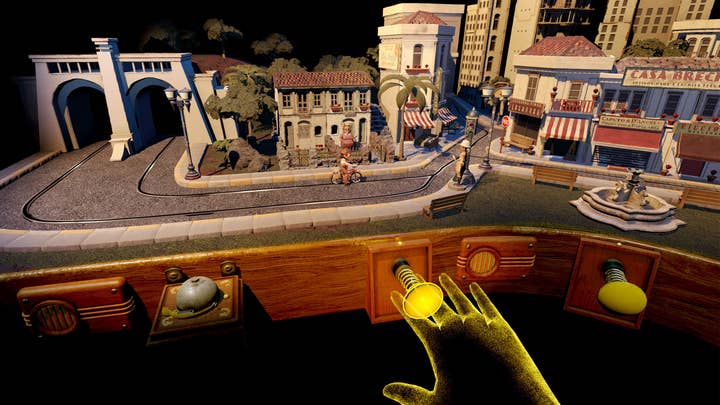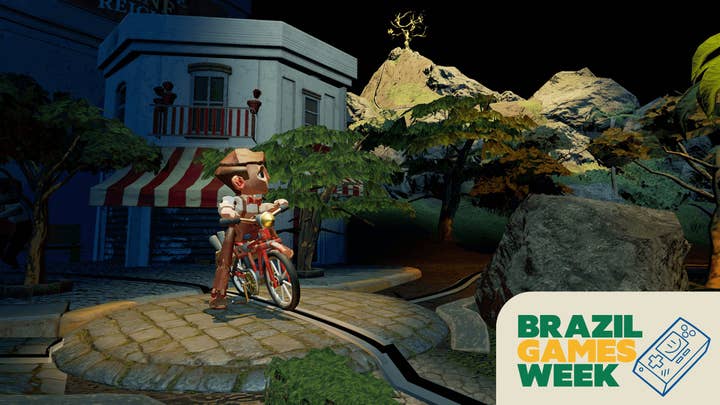Arvore's road to becoming an Emmy-winning VR developer
Studio co-founder Rodrigo Terra shares why he believes in the power of virtual reality
Just as there have been Brazilian game developers since the 1980s, so too has the country's creative talent been pioneering with virtual reality from an early stage.
Rodrigo Terra, president of Brazil games trade body Abragames and co-founder of VR studio Arvore Immersive Entertainment, has been working with VR since 2014, having experimented with the Oculus Rift DK1 "way back before Facebook bought Oculus," he laughs.
"When VR first appeared, I thought it was amazing because I could drop the screen and live in a place, be in a world, and live an experience, not just looking at a screen," he tells GamesIndustry.biz.
However, the market for virtual reality in Brazil is currently quite small, although Terra tells us this hasn't dissuaded the major players in this space from trying to establish a foothold in the region.
"[The big companies] trying to market VR headsets as productivity tools, but they're not there yet," he tells GamesIndustry.biz. "Apple is doing a good job in this direction, and Meta is making the right investments in another direction, and that's the best way to foster [growth]. But here, [adoption] will take time.
"Access is important. Smartphones are popular here because there was a public policy that made it possible to manufacture smartphones [in Brazil], and that cut the price in half. VR [doesn't have] the same thing."
But the VR community in Brazil is growing, he says. As with other products hindered by the country's limitations on importing technology, determined developers have found other ways to bring headsets into the country – "you can import them directly, put them in your bag, or whatever" – so there are some VR players in the region.
"It's a niche, but that's why we're looking at the global market at Arvore, not just the Brazilian market," he explains. "We know the Brazilian market will take time to grow. If Meta, Google, and Apple start selling here officially and invest here, I'm pretty sure we can change this momentum and the adoption will be bigger.
"If Apple could fit all that technology in that little thing, which is super light, what can we do in ten years? It's moving that way, and players are now investing"
"Brazilian people love technology. We're among the first on each [new] digital wave. WhatsApp, we were first. Discord, we were second. TikTok, we were second. We're a heavily digitised population, so it's just a matter of access. If you bring something here at a price people can afford, you'll see an explosion."
Arvore was founded seven years ago by Terra with his co-founder and friend from university, Ricardo Justus. At the time, the pair were running a television production company, but both were interested in gaming and new technology. They began talking in 2015 about the potential for virtual reality, and whether there was scope for a VR games developer in Brazil – even though there were no consumer headsets in the market at that time, just prototypes.
"We thought we could do it, because commercial VR created a second wave of companies — Survios, Owlchemy Labs, and the others were the first wave, and the second wave was starting, so it was a good moment to do it."
The duo began by bootstrapping, spending a year pitching the vision for their company to investors, and eventually securing some seed funding. They then drew on gaming talent they had met, as well as folks from other technology and creative industries such as film and TV. Then, in 2017, Arvore Immersive Entertainment was born.
The company began by working on both B2B and B2C projects, as well as physical and location-based installations.
" Immersive experiences were what we saw as the future of entertainment, and they still are," says Terra. "We thought it was a good idea to do it here in Brazil because there's people, talent, access to money, and an international and blue ocean market where we could start working. But, as we sometimes say here, the marathon starts two steps behind for us. What we needed was to develop a team that was so creative, so diverse, that we could create unique projects that could be recognised among the other big guys."

Arvore's first commercially released VR game was Pixel Ripped 1989, an homage to retro video games played from a first-person perspective. Debuting in 2018, it was followed by a 1995-themed sequel – but it was the studio's third game that put it on the map in a very different way.
The Line is a 20-minute interactive love story led by film director Ricardo Laganaro. It was submitted for inclusion in the 2019 Venice International Film Festival and even won the prize for best VR immersive experience – and that wasn't the only award it would pick up.
"It was the first time Brazil had won a prize in Venice," Terra says. "76 years of that festival, and the first [Brazilian] win was a VR title. And in 2020, we won the Primetime Emmy for outstanding innovation in interactive programming. And then we thought, 'Okay now we are playing.'
"Immersive content for us is something that we can use to showcase that our work can be recognised and loved by global audiences. We tell universal stories, games that everyone in the world can understand and love, but we always put a Brazilian flavour in it. Seven years on, and we're still going. There have been many movements in the market with this year's ups and downs but we're still here, and we're growing more and more. And we still believe in the market."
Inevitably, our conversation turns to virtual reality's struggles to become a mainstream proposition. Terra notes that he's heard people suggest it will take off in the next year or two, adding: "But I've been hearing that since I started."
"Immersive experiences were what we saw as the future of entertainment, and they still are"
Nonetheless, he maintains that VR eventually becoming more than a niche is a "no brainer."
"I don't know exactly when it will happen, but it's going to be mainstream," he says. "We won't need to use phones and computers in ten, 15 years. Why use those gadgets if I can have something [immersive]? It's a matter of time.
"If you took everything out of an Apple Vision Pro, [you'd] see it's a ski goggle but a thin one. If Apple could fit all that technology in that little thing, which is super light, what can we do in ten years? It's moving that way, and players are now investing."
For Terra, virtual reality currently stands as "a niche you can survive in." For now, that niche is adults with disposable income and an interest in newer technologies, but as more children get into VR – perhaps gifted headsets as a big Christmas present, Terra suggests – a new generation of players will rise.
"That generation is now starting to play games and VR is an entryway to that. For new generations, immersive technologies and platforms are now part of the mix of how they have fun. What I'm looking for is [people in future] who have VR or XR as part of their lives and how they play.
"It's still a niche today, but it's a niche that is starting to be understood. It's not an experiment anymore, it's not Virtual Boy, it's an industry, it's definitely growing, and it will get there. If I knew whether it will take five years or ten years, I'd be a multibillionaire. "

